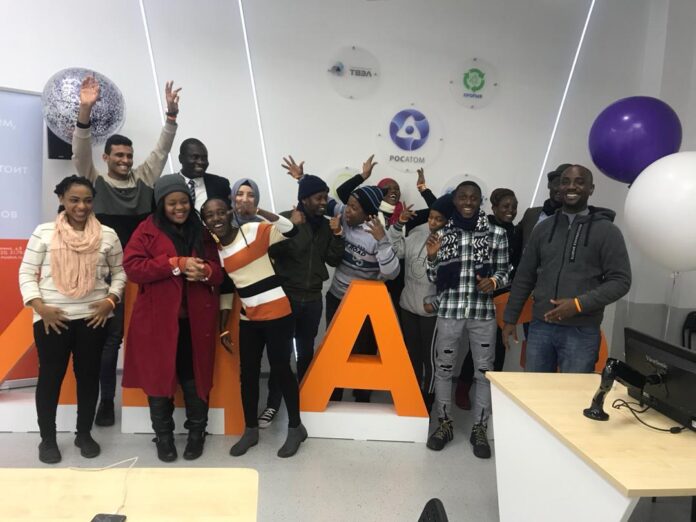
Leading global giant in nuclear technologies, Russia’s state-run nuclear energy corporation ROSATOM has sustained its African tailored policy of raising the next generation of nuclear energy technology experts in Sub-Saharan Africa.
Every year since 2015, the company invites students and young professionals across the region to partake in online video competition “Atoms For Africa”. This year the competition was running till September 30th and is also facilitated by EnerConnect as well as the African Young Generation in Nuclear (AYGN) and South African Young Nuclear Professionals Society (SAYNPS).
Moreover, Rosatom invites African students to study at the top Russian universities specializing in nuclear engineering such as National Research Nuclear University MEPhi in Obninsk (Central Russia) and Tomsk Polytechnic University (TPU) in Tomsk (Siberia, Russia).
National Research Nuclear University MEPhI is the leading Russian university with more than 75 years expertise in nuclear engineering. MEPhI is the key partner of Rosatom in the field of training high-qualified nuclear specialists. Nowadays more than 1500 foreign students from 57 countries study there, including over 50 students from sub-Saharan Africa, including Ghana, Kenya, Nigeria, Tanzania, Uganda, Ethiopia, South Africa and Zambia.
MEPhI provides three academic degrees: Bachelor’s Degree involves such programmes as Nuclear Power Engineering and Thermo Physics, Nuclear Reactors and Materials, Nuclear Power Plants: Design, Operation and Engineering, Master’s Degree – Nuclear Physics and Engineering, Nuclear Power Engineering and Thermo Physics, and Postgraduate Degree – Nuclear Power Engineering and Technologies.
TPU is one of the leading state universities that specializes in training specialists in the nuclear field along with training professors for universities in Rosatom partner countries. In over 60 years of history, more than 12 000 specialists graduated TPU, including 8 000 ones trained in nuclear engineering and research.
TPU is the only Russian university equipped with a nuclear research reactor available for foreign students to perform scientific research on. The IRT-T research reactor has been put into exploitation in July 1967. It is used for peaceful atom technologies: nuclear medicine, transmutation neutron alloying, isotope engineering, thorium power engineering.
TPU offers three academic degrees: Bachelor’s Degree involves such programmes as Nuclear Physics and Engineering, Master’s Degree – Design, Maintenance and Engineering of Nuclear Power Plants, Control and Safety of Nuclear Reactor, Nuclear Medicine, and Postgraduate Degree – Nuclear, Thermal and Renewable Energy and Related Technologies.
Underscoring ROSATOM’s commitment towards nurturing young professionals in the field of Nuclear energy, Valery Karezin, Director of Educational Projects and the HR Service at ROSATOM, noted on the occasion: “About 300 students from more than 15 African countries are already studying nuclear specialties in Russia. We also contribute to the development of higher education in the field, strengthening cooperation between higher education institutions in Russia and Africa”.
Meanwhile, Russia helps young professionals to study abroad; Ghanaian students have an opportunity to get nuclear education in their own country. The School of Nuclear and Allied Sciences (SNAS) was jointly established in 2006 by Ghana Atomic Energy Commission (GAEC) and University of Ghana (UG) with the collaboration of International Atomic Energy Agency (IAEA) in response to the increasing threat of nuclear knowledge loss in Ghana and Africa.
The School currently has five academic departments that offer twelve accredited Master of Philosophy (M.Phil.) and Doctor of Philosophy (PhD) programmes, and a 5 month IAEA postgraduate Education Course (PGEC) in Radiation Protection. The areas of specialization are the department of nuclear sciences and applications, department of nuclear safety and security, department of nuclear engineering, department of nuclear agriculture and radiation processing and department of medical physics.
The School exists for preservation, maintenance and enhancement of nuclear knowledge in Ghana and Africa through the provision of high-quality teaching, research, entrepreneurship training, service and development of postgraduate programmes in the nuclear sciences and technology.
Director of Administration at the GAEC Mr. Felix Adiku acknowledged that the establishment of the graduate SNAS and collaborations with the IAEA and other strategic international agencies have helped train the requisite manpower needed to successfully operate, maintain and decommission a nuclear power plant.
Speaking at the orientation ceremony, the Director-General of GAEC, Prof. Benjamin Nyarko commended the initiative saying, the move will create room for beneficiaries to handle jobs at the international level. He stressed that lack of professionalism and proper training in the system is crippling the informal sector.
Source: Ghana/Starrfm.com.gh/103.5FM

